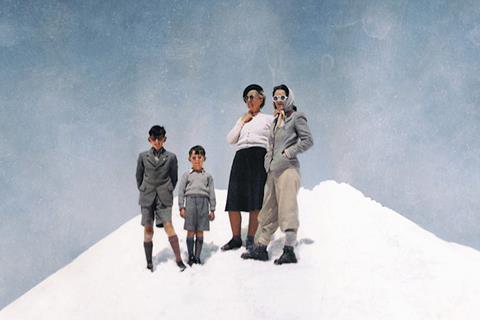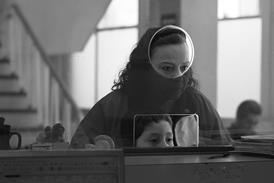Mark Cousins examines the life and work of Scottish artist Wilhelmina Barns-Graham in his latest cine-essay

Dir/scr: Mark Cousins. UK. 2024. 88mins
Mark Cousins brings his distinctively poetic and enquiring approach to this elegiac cine-essay exploring the creative life of 20th century Scottish abstract artist Wilhelmina Barns-Graham. A key member of the St Ives group, Willie, as she was known, was dismissed by critics as an also-ran for much of her career. Cousins’s film harnesses Willie’s free-wheeling, associative way of looking and thinking to explore how her neurodiversity – she had synesthesia – and other factors shaped her work.
Cousins’s film harnesses Willie’s free-wheeling, associative way of looking and thinking
Cousins’s passion for his subject is infectious – he even gets a Wilhelmina Barns-Graham tattoo at one point – and it’s impossible not to admire his determination to avoid art world documentary cliches. Still the focus on the work first and foremost can feel a little single-minded and even limiting; a touch more biographical background colour wouldn’t have gone amiss.
A Sudden Glimpse To Deeper Things – the title quotes an entry in Willie’s diary about a pivotal event in the artist’s life – premieres in the main competition in Karlovy Vary and should generate interest at further festivals. UK-Ireland rights were picked up by Scotland-based distributor Conic in advance of the festival, with a release dated for October 2024. While Barns-Graham perhaps doesn’t have the name recognition and pulling power of some of Cousins’s other recent subjects, such as Alfred Hitchcock, Orson Welles and cinema in general, the director’s own reputation should serve as a selling point for art world and cine-literate audiences.
Cousins introduces his subject through a series of photos of her in later life: a handsome, silver-haired elderly woman with sensible shoes and a waterproof jacket. He challenges the assumptions that we might make about the little old lady in the pictures, gradually peeling back prosaic details to reveal the radical, starkly beautiful work that she produced.
Willie came from money, this much is revealed. She was born in St Andrews, Fife in 1912, into a family of landed gentry. Her authoritarian father would bring a whip to the dinner table, in order to discipline those whose conversational topics displeased him. He was firmly opposed to Willie’s ambition to become an artist, and it was, in part, to escape her family that Willie relocated to St Ives in 1940. There she found a community of like-minded artists – something which is rather glossed over in the film, which prefers to focus on the inspiration that she drew from the quality of the light in Cornwall and the visual rhythms of the natural world.
But, Cousins argues, Willie’s most profound and life-changing moment came during a visit to Switzerland in 1949, when she climbed the Grindelwald glacier. The landscape fascinated her, and would provide her with inspiration for decades to come. Cousins, slightly misleadingly, describes it as an “infection” in one of several oblique chapter headings. But the cumulative power of the work is arresting: Cousins shows us the impact of exploring the glacier on her creative output in a simple but powerful slideshow montage, accompanied by an exaltant score by Linda Buckley. Elsewhere, Tilda Swinton narrates passages from Willie’s diaries, and the film also includes audio recordings of the artist herself plus illuminating contributions from Lynne Green, an art historian and the author of a book on Barns-Graham.
Not everything works: a segue in which Cousins worries that a Barns-Graham painting, bought for him at auction, might be a fake is an odd digression. And an account of a Willie-themed art installation, created by Cousins, sits a little awkwardly in the film. These, however, are balanced out by moments of striking beauty. The film mounts a convincing argument that Wilhelmina Barns-Graham’s unfairly sidelined art is well worth celebrating.
Production company: BOFA Productions
International sales: Reservoir Docs doc@reservoirdocs.net
Producer: Adam Dawtrey, Mary Bell
Cinematography: Mark Cousins
Editing: Timo Langer
Music: Linda Buckley























